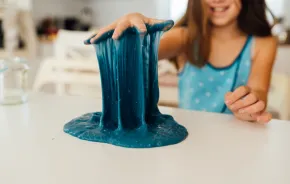
Among the adult male voices imprinted on my memory, only that of my father goes back further than this one. Not even my two uncles who lived in Seattle when I grew up, not even the men heading the households in my neighborhood, not even the anchormen I heard every evening on the news, have been more immediately recognizable to me by their voices than the voice of Julius Pierpont Patches, Seattle’s beloved hobo-clown.
As far back as I can remember, and in fact back to 1958, J.P. Patches, the “Mayor of the City Dump,” came on television every morning and again every afternoon to amuse both children and adults — we kids loved his slapstick antics and the cartoons he would introduce by taking off his hat so the camera could zoom into it, and the adults sat behind us busting a gut at J.P.’s double entendre and at other aspects of the show that were above our heads.
For instance, all the other characters besides J.P. were played by one man, Bob Newman, including Gertrude (J.P.’s girlfriend I guess), the Swami of Pastrami, Boris S. Wart (the second meanest man in the world), Ketchikan the Animal Man, Gorst the Friendly Furple, and the voice of Miss Smith of Miss Smith’s Delivery Service, whose front side we never saw but she was ostensibly a white-haired old lady who rode a motorcycle, wore a helmet and leather jacket and growled like a longshoreman. Sometimes J.P. would tease his fellow actor by putting him in the impossible position of having to voice one character while appearing as another, for instance, if Gertrude was present he would say “let’s call up Ketchikan the Animal Man and see what he knows about this”, and while J.P. called Ketchikan on the huge black phone, Newman-as-Gertrude would have to step surreptitiously off-camera and throw his voice so that we kids would believe that Ketchikan was on the other end of the line. The two actors frequently cracked up in fits of laughter, and the crew was notorious for bonking J.P. on the head with the microphone boom or delaying sound effects.
The show, which ran until 1981, was unrehearsed and improvisational and completely off the wall. J.P. had a doll named Esmerelda whose contribution to the show was a canned child’s laugh track that was played whenever he spoke to her. There was a stuffed dog named Griswald, a grandfather clock whose face became animated when he spoke with J.P., and Tikey Turkey, a headless rubber chicken that “lived” in a metal oven at the back of the room. There was also a bookworm named Sturdley that emerged from a shelf of books occasionally. Often Chris Wedes, who played J.P., and Newman came into the studio not having any idea what they would be doing on the show, but with so many characters and friends, there was never a dull moment. This was early T.V.
Several generations of Seattleites grew up with J.P. and call themselves “Patches Pals” to this day. Many were brought onto the show as part of a scout troop or school class. As a kid I thought these were the boring moments, where twelve kids would shuffle in and J.P. would stand behind each one and ask their name, and if the kid wasn’t paying attention he’d grip their head in his hands and tilt it up to look at him. But for the kids who were on the show, it was a moment they never forgot.
No one ever forgot J.P.’s ICU2-TV set. Say it out loud to get the joke. This was a cardboard box with a T.V.-tube-shaped opening into which J.P. would peer while sitting “Indian style” on the floor. The camera was inside it, and the set’s magical powers allowed him to see that, for instance, little Katy who was turning seven should look in the dryer for her birthday present, or Jamie, who might be turning nine, should look in his sock drawer. Parents would call the studio with these hiding places and J.P. would “discover” them through the ICU2-TV set.
J.P. never talked down to kids, and they could always tell that he enjoyed their own wit and energy. He made them the stars. His games of Simon Says, which he has continued to conduct at the many public events he has appeared at in the decades since the show went off the air, were legendary.
Last fall, I found out by the merest happenstance — a newspaper headline glimpsed on the sidewalk — that Wedes would be making his last public appearing as J.P. Patches at the Fishermen’s Fall Festival at Fishermen’s Terminal. Patches Pals old and young would be able to see the Mayor of the City Dump live just this one more time.
I hadn’t seen J.P. in a live performance since the early ’90s when I wrote an article about him for a local newspaper. I felt a sudden and profound sense of loss, perhaps exacerbated by the fact that my father recently passed away, as did a beloved older member of our church community. There has been entirely too much of old men riding off into the sunset lately for my inner little boy. I had to see J.P., and although I didn’t know if she would appreciate the significance of seeing a clown she’d never heard of, I wanted my older daughter Mara to be able say someday that she saw J.P. Patches do his thing. This would be her only chance.
We hit the road.

We got to Fishermen’s Terminal in plenty of time, even found the last parking spot, but I had grossly underestimated, or forgotten, the loyalty and dedication — to say nothing of the sheer numbers — of Patches Pals. It was like trying to see Jesus. There were a few score plastic chairs set out in front of the stage, but just beyond the last row of chairs — all of which were occupied — was an impenetrable wall of Patches Pals. Mind you, these are not kids, these are people in their 40s and 50s. There were a dozen or so kids down in front — we could not get there and there was no room anyway — but the seething throng of hundreds of people were adults like me who quite simply adored J.P. Many wore the signature red clown nose of the Patches Pal.
I am too slight and too old and Mara now too big for me to put her on my shoulders, but I hoisted her onto my back in piggyback fashion and she could just barely see over my shoulder, between the arms of the people holding up digital cameras, to the place on the stage where J.P. was. He asked if everyone here were Patches Pals and the place erupted in a single affirmative roar. Similarly a negative when he squinted and wondered if there were any “Boris Buddies” present (Boris Buddies are the minions of the second meanest man in the world). Then he got to the business of the Simon Says contest for kids, the Simon Says contest for adults, and the hula hoop contest. Candy was doled out to winners and losers alike.
I was sad that we couldn’t see him better, but two-thirds of the way through the show a spot opened at the front of the human wall that Mara could get to and she bravely threaded her way among the knees and elbows and got to where she could see a little better.
After the show J.P. was escorted by Seattle Police officers to a booth where a line formed for autographs that included literally hundreds of people. Instead of standing in this line, Mara and I went and got fish n’ chips. Checking back after an hour, we found the line to be just as long. Mara really wanted to get an autograph (and was even keener to have the J.P. action figure), but she wisely chose again to give the queue a miss, whereupon we sheared off to join the madness of hundreds of children trying to build wooden boats with their parents standing behind them nipping at their every move. (J.P. was just one attraction at this festival, which included lots of things for kids to do.) We checked the line one last time and it had not shrunk, or really even moved much. Everyone wanted to sit down with J.P. and get their picture taken, which took time. I wondered how long the old man could do this. It must have been exhausting, all that adoration.
 I was feeling bad that I hadn’t been better prepared both for viewing the show — and there’s no next time to apply lessons learned about Patches Pal Density Quotient — but we made the right choice, because as we were walking to our car we saw J.P. being driven away, and it had only been a few minutes since we last saw the line snaking away across the grounds. I can’t imagine the disappointment of all those people in the line who never even got to the booth, who were told, in effect, sorry, J.P. is over forever.
I was feeling bad that I hadn’t been better prepared both for viewing the show — and there’s no next time to apply lessons learned about Patches Pal Density Quotient — but we made the right choice, because as we were walking to our car we saw J.P. being driven away, and it had only been a few minutes since we last saw the line snaking away across the grounds. I can’t imagine the disappointment of all those people in the line who never even got to the booth, who were told, in effect, sorry, J.P. is over forever.
The passenger-side window in his car was rolled down as he passed, and I shouted “We love you J.P.!” Another lady said the same thing right after me (copycat).
“Thank you,” J.P. said with a wave. “Goodbye!”
Matt is a longtime Seattle resident who blogs at Just Wondering, where an earlier version of this post appeared last fall.









